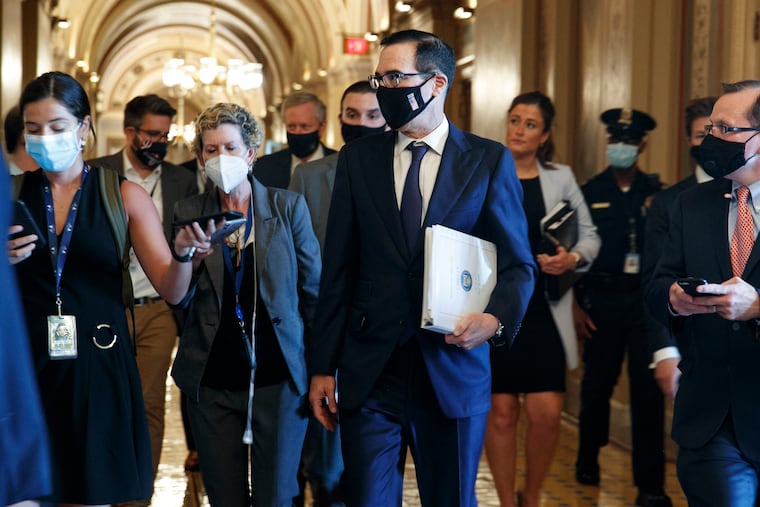Democrats warn GOP divisions are delaying coronavirus aid
Despite disarray in the Republican ranks, Senate Majority Leader Mitch McConnell is pushing ahead on the next COVID-19 aid package.

WASHINGTON — Despite deep Republican divisions, Senate Majority Leader Mitch McConnell pushed ahead Wednesday toward a COVID-19 aid package with the White House as Democrats warned the GOP is delaying needed relief to Americans during the crisis.
Key GOP senators revolted over the emerging $1 trillion effort as the price tag could quickly swell. Conservative Republicans vowed to slow-walk passage of any bill. But pressure is mounting as the virus outbreak deepens, and a $600 weekly unemployment boost and a federal eviction moratorium come to an end starting Friday.
“We’re hopeful we’ll be able to get there,” McConnell told reporters.
Briefings were underway at the Capitol and the Republican leader hoped to present a working draft late Wednesday or Thursday. But the size and scope of the federal spending, and the jumble of competing priorities from President Donald Trump and GOP senators, left the outcome uncertain as the pandemic death toll climbed past 142,000.
“I just don’t see the need for it,” Sen. Ron Johnson, R-Wis., told reporters Wednesday.
Exasperated Democrats, who already approved House Speaker Nancy Pelosi's more sweeping $3 trillion package two months ago, said time is running out for Trump and his GOP allies to act.
“We’re still on the 20-yard line?” Senate Democratic Leader Chuck Schumer said, referring to White House comments. “Where have the Republicans been?”
With millions out of work and a potential wave of evictions ahead, the severity of the prolonged virus outbreak is testing Washington's ability to respond. Schools are delaying fall openings, states are clamping down with new stay-home orders and the fallout is rippling through an economy teetering with high unemployment and business uncertainty. A new AP-NORC poll shows very few Americans want full school sessions without restrictions in the fall.
The White House negotiators, Treasury Secretary Steven Mnuchin and Mark Meadows, the president’s acting chief of staff, arrived late at the Capitol. After a raucous meeting Tuesday, senators did not discuss the package at Wednesday’s lunch. Still, Meadows said other talks had progressed, pushing Republicans to the 35-yard line.
But Trump and his GOP allies are tangled over his push for a payroll tax cut, which many Republicans oppose. They also are straining to come up with a way to limit the extra jobless benefits, which many Republicans say are paying people too much money. A stopgap measure may be needed to prevent a benefits shutoff.
As the Republicans battle over their priorities, Democrats warn they are wasting precious time.
“We are just days away from a housing crisis that could be prevented,” said Sen. Elizabeth Warren, D-Mass.
McConnell’s blueprint is expected to include a new round of direct payments to earners below a certain income level, similar to the $1,200 checks sent in the spring. It also will likely have some version of Trump’s demand for a payroll tax holiday for workers, which many Republicans oppose.
Republicans said they want to replace the $600 weekly federal jobless benefit with a lower amount. Sen. Rob Portman, R-Ohio, said it would likely be swapped for one more closely pegged to state benefits rates. That means workers in states with larger benefits would get a more generous add-on.
“We cannot allow there to be a cliff in unemployment insurance given we’re still at about 11% unemployment,” Portman said.
Republicans want to include at least $105 billion for education, with $70 billion to help K-12 schools reopen, $30 billion for colleges and $5 billion for governors to allocate. The Trump administration wanted school money linked to reopenings, but in McConnell’s package the money for K-12 would likely be split between those that have in-person learning and those that don’t.
Sen. Marco Rubio, R-Fla., said there will be another boost for small business lending in the Payroll Protection Program. “It’s going to be big,” he said.
The centerpiece of the GOP package will be McConnell’s five-year liability shield to protect businesses, schools and others from COVID-related lawsuits. It’s also likely to include tax breaks to help shops and workplaces retool safely for the reopenings.
Mnuchin and Meadows made it clear during a private meeting Tuesday with Pelosi and Schumer that the White House was resisting Democratic proposals for new spending on virus testing, housing aid or money for cash-strapped states, according to a person granted anonymity to discuss the private talks.
Republicans said some $150 billion allotted previously to state governments is sufficient to avert sweeping layoffs, and they said more housing protections are not needed.
Trump’s payroll tax break divides the party. Opponents say it does little to help out-of-work Americans and adds to the debt load. The tax is already being deferred for employers under the previous virus relief package. Supporters say cutting it now for employees would put money in people’s pockets and stimulate the economy.
Sen. Mitt Romney, R-Utah, who opposes direct checks in favor of more targeted aid, lamented the White House’s handling of the crisis. “I don’t think it’s been a great example for the world to see,” he said. “We’re still struggling.”
McConnell's attempt to pull the party together is only going to become more difficult as he launches negotiations with Democrats. The price tag will almost certainly rise.
Democrats are calling for $430 billion to reopen schools, bigger unemployment benefits and direct aid checks, and a sweeping $1 trillion for state and local governments. They also want a fresh round of mortgage and rental assistance and new federal health and safety requirements for workers.
Congress approved a massive $2.2 trillion aid package in March, the biggest of its kind in U.S. history. Pelosi pressed on, passing her $3 trillion House bill in May. McConnell at the time said he wanted to “pause” new spending.